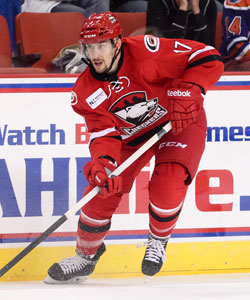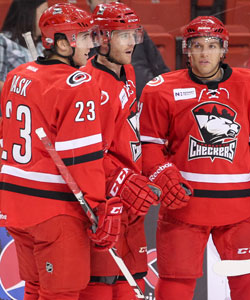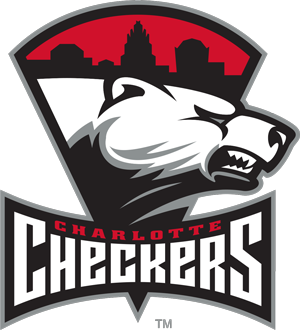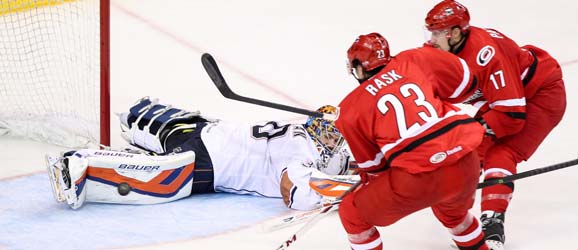The Checkers’ first line of Zach Boychuk, Aaron Palushaj and Victor Rask, easily the most skilled grouping the team has used to this point, had a multitude of scoring chances in the season’s first game against Oklahoma City and broke through in a big way in game two, with its members having a hand in all three of the team’s goals.
Given that the trio had never before played together – Rask, a rookie, only played a handful of games with Charlotte last season and Palushaj is new to the organization entirely – it’s a chemistry one may not have expected to develop so quickly.
“From the first practice you could tell things were going to click,” said Palushaj, whose three points (1g, 2a), all in Sunday’s game, make him the team’s early scoring leader. “We’re all good passers and like to find each other and we can all score as well. Sometimes it takes a few weeks to gel and sometimes it happens right away.”

“He’s tenacious, has good speed and skill to play with Rask and he’s also really vocal,” said coach Jeff Daniels of Palushaj. “He’s been a good fit.”
Like many other players in the league, Palushaj finds himself at a crossroads in terms of being able to translate that success to the NHL. He’s had opportunities there, but mostly in a fourth-line role over the course of 66 total games with Montreal and Colorado.
“In college and in the AHL you’re one of the top players on a team and you’re relied upon to win games,” said Palushaj, who scored nine points in 25 games with the Avalanche last season. “I like that role because I like that pressure, and being the competitive guy that I am, I want to be able to do it with the best players in the world.”
Now in his fifth professional season, Boychuk, also 24, can tell a similar story. With a goal and an assist on Sunday, he’s picked up where he’s been for the entirety of an AHL career that has produced 191 points in 229 games. Getting to the next level has always been the challenge, one that came to a head last season when he played for three different NHL teams while bouncing through the league’s waiver system.
His future with the organization may have been in question after the season – the restricted free agent did not sign a new deal until just before training camp – leaving it up to Boychuk to put himself back on the map.
“Everyone will point to last year as a disappointing year, but to have that experience of playing in other organizations and learning from new people, coming back to Charlotte (in March) was the best I’ve ever played,” he said. “Now I’m just hoping to get another chance in the NHL.
“This year was probably the best camp I’ve ever had with Carolina, and it’s good to leave on a high note and with a lot of confidence. I need to continue to show them that I want to be here and that I’m ready to take advantage of the opportunity.”

For Rask, a 2011 second-round pick who has one assist thus far, that small dose of experience last season made a difference.
“It’s always good to get that taste ,” said Rask, who scored five points (1g, 4a) in 10 games before returning to another productive season with Calgary of the WHL last season. “Last year I was living in a hotel and not really knowing how long I was going to be here, but now I have a place and I’m getting to play with two great players.”
How well his adjustment continues will be the key to that line, though the Checkers, as currently constructed, don’t have a bevy of other skill centers to use in that place. Wary of putting too much pressure on the rookie, Daniels said he’d take a wait-and-see approach as far as Rask playing such a prominent role, though his so-far reliable defensive play has been a good complement to his offensive instincts.
Against tougher match-ups, there could also be the concern of having the lineup be too top-heavy, with Chris Terry the only experienced scorer outside of that unit. Secondary scoring from the likes of Justin Shugg and Brody Sutter will also be key to its continued use.
Until then, if nothing’s broken, there may not be much fixing to do. The first line is, after all, the only line that has remained unchanged since the first day of training camp.
“I think it’s only going to keep getting better as we learn each other’s tendencies,” said Palushaj.






